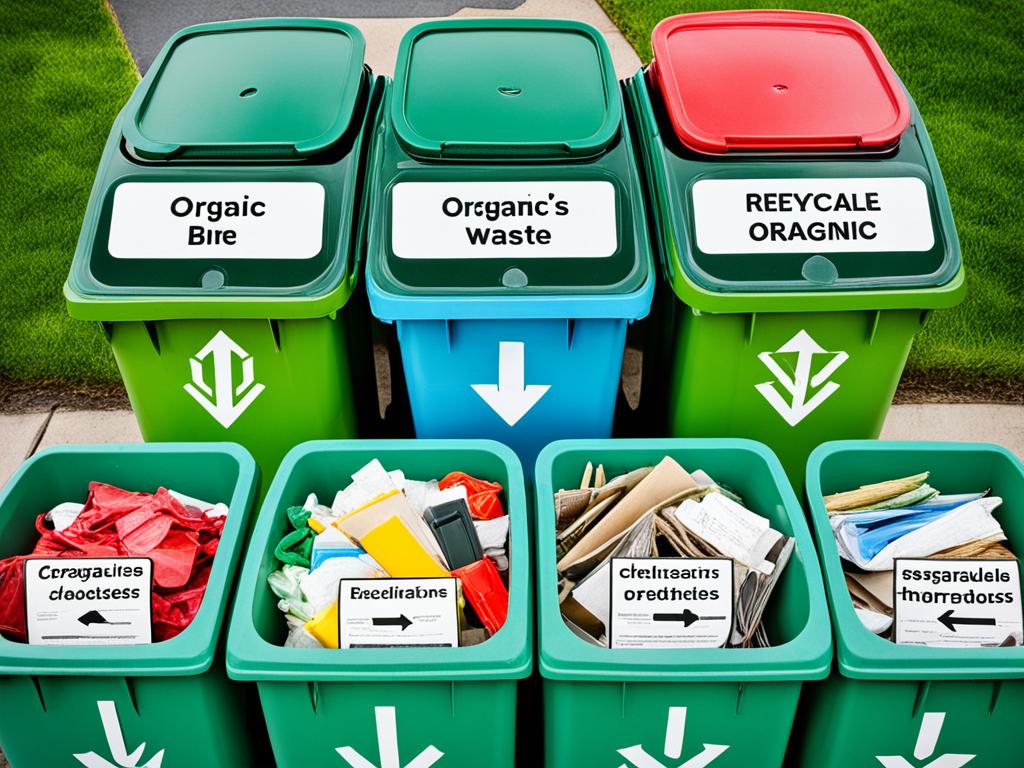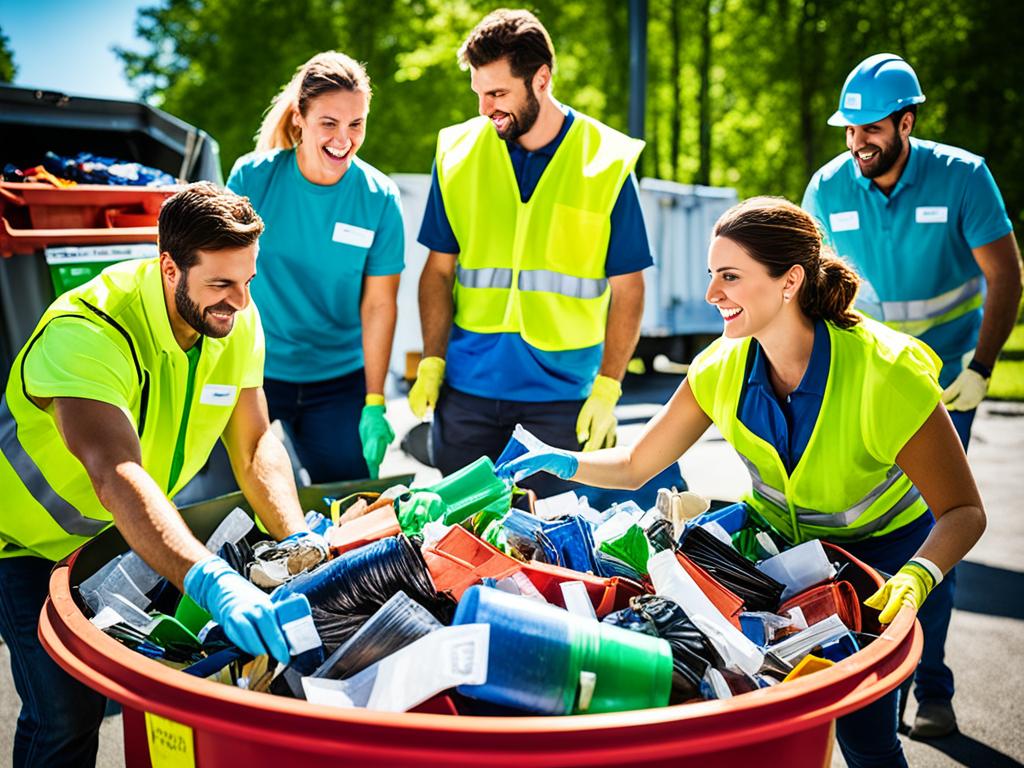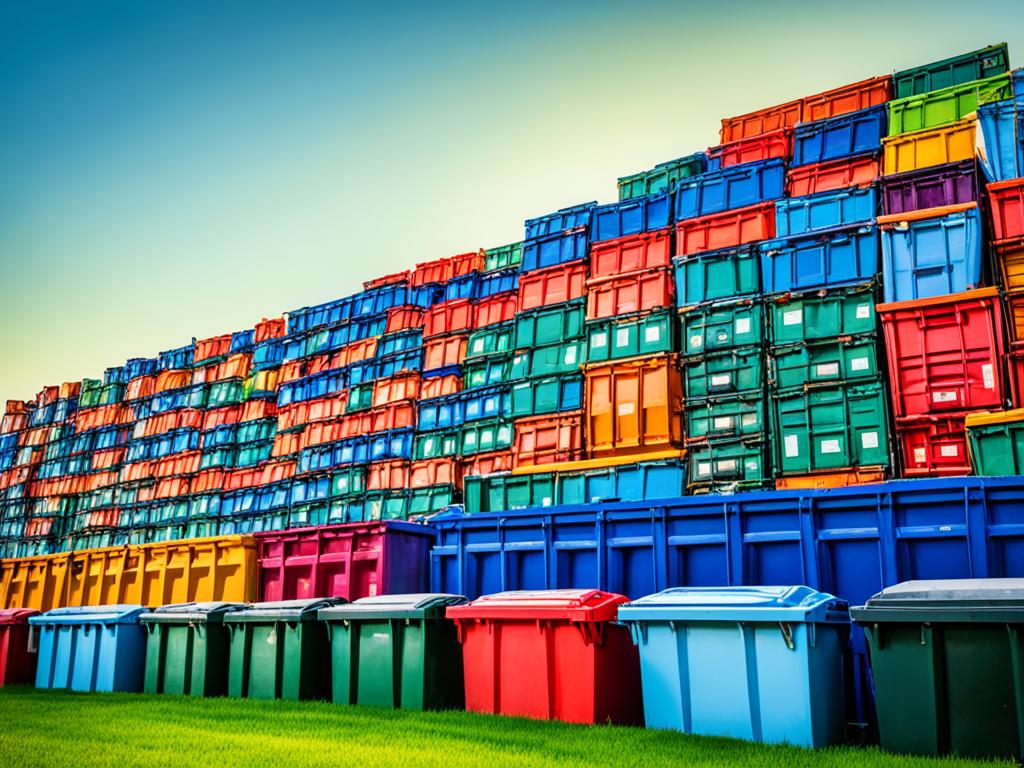Businesses play a big part in creating waste every day. They can help by using effective recycling and reusing strategies. This not only cuts down their waste but also saves money. Employees who care and get involved make a big difference. They help their company change for the better.
When a business focuses on a circular economy, it leads to less waste. This means there are more chances to prosper financially. Plus, they help make the future more sustainable for all of us.
Key Takeaways
- Businesses are major contributors to the waste problem, generating large amounts of waste daily.
- Effective recycling and reusing strategies can help businesses reduce their environmental footprint and save costs.
- Employee engagement is crucial for successful waste management initiatives within an organization.
- Embracing circular economy principles can unlock new economic opportunities and promote sustainability.
- Shifting towards a sustainable, waste-reducing mindset can benefit both businesses and the environment.
Understanding Waste Management Strategies
Being smart about waste is key for homes and businesses. It helps lessen harm to the planet. Waste management is about organizing the way we get rid of what we don’t need. This can mean using the city’s trash service, renting dumpsters, or using compactors.
Definition and Importance
Waste Management Strategies are the plans we use to deal with waste. They matter a lot for keeping our planet clean. Good waste management not only helps the environment but also saves money and protects resources.
Types of Waste and Disposal Methods
Waste includes things like regular trash, industrial waste, and dangerous waste. Waste Disposal Methods are how we get rid of these different kinds of waste. This includes putting them in landfills, burning them, or finding ways to reuse them.
Using methods like recycling and composting can keep waste from piling up in landfills. It also cuts down on pollution. Creating energy from waste is another way to both clear waste and make something useful out of it. It’s about using a mix of ways to handle waste well.
Knowing the best Waste Management Strategies lets us all do our part. It’s important for both businesses and people. With the right approach, we can make less waste, recycle more, and help our planet. This approach is crucial for a sustainable future.
Source Segregation: Sorting Waste at the Source
Sorting waste at the start, called source segregation, is key in good waste management. This means putting waste in different groups from the beginning. It makes recycling and getting rid of waste work better. Separating waste at home, work, or factories can make a big difference for our planet. It can lower the amount of waste that’s not recycled properly.
Benefits of Source Segregation
Practicing source segregation has many good points. It cuts down on putting trash in landfills and saves nature’s materials. This way, recycled stuff doesn’t get messy, keeping it high quality and cheaper to manage.
Implementing Effective Sorting Systems
Having the right place to sort waste is very important. This includes having separate bins or containers for each type of waste close to where it’s made. It’s also vital to teach people why this matters. This helps recycling programs keep going over time.
Rules set by the government are also crucial. They help make sure that sorting waste at the source happens more often. By offering rewards and making it a must, these rules lead to less harm on the planet. They also save money.
Conducting Waste Audits
Conducting regular waste audits is key for checking waste generation patterns. It helps find areas that need to get better. This process lets us know what waste we make. It lets companies decide how to use less waste. This can lead to saving money and doing more to help the planet.
By watching what goes where, we can understand our waste better. Looking at the data shows us how to do things differently. It helps us sort waste into groups like what can be reused. Going to the place where waste is made helps us learn how to make less. It also teaches workers how to throw things away the right way.
Analyzing Data for Cost Reduction
Waste audits tell companies a lot about their waste. They show where we can do better. We should check this info to see what needs more work. Changing things like trash bin sizes and adding more recycling helps a lot.
Setting goals for using less and recycling more is a good idea. This should be done in one to two years. Making plans and sharing tips with workers is important too. Figuring out what can be used again is great for the planet and saves money.
| Statistic | Insight |
|---|---|
| 77% of what is thrown out is not trash. | This shows many things we throw away can be used again. Doing waste audits helps find better ways to deal with this waste. |
| Badger Balm managed to reduce its trash output by 77% through various waste reduction strategies. | This shows that knowing what waste we make and making plans can really help. It makes a big difference for the environment. |
| Badger Balm conducts quarterly waste audits to track waste reduction progress. | This shows how important it is to keep checking on how we’re doing. Doing waste audits often helps make sure we keep getting better. |
| Businesses with relatively small trash output, like offices and boutiques, often conduct waste audits independently. | This tells us that small companies can also do well with waste audits. It helps all kinds of businesses find ways to use less waste. |
| Great Forest recommends hiring experts for waste audits for specific purposes such as achieving LEED or TRUE certification. | This suggests that for some big goals, like getting special green certifications, it’s good to have professionals do the waste audits. They can do a really good job. |
Waste Minimization Techniques
Using waste minimization methods helps companies become more sustainable. A key step is using fewer disposable, single-use items. Even small changes in places like breakrooms can make a big difference.
Reducing Single-Use Items
Using less single-use items cuts down on waste. Easy steps like offering reusable mugs and utensils at work can do a lot. And asking staff to use their own water bottles and coffee cups helps, too.
Process Optimization and Product Redesign
Businesses can dive deeper by looking into process optimization and product redesign. Things such as lean manufacturing, streamlining how things are made, and redesigning products reduce waste. This move from waste management to waste prevention is key for long-lasting sustainability.

Using these waste minimization steps and more can really change how a business impacts the planet. It leads to cost cuts, saves resources, and supports a circular economy. A full-on plan for sustainable manufacturing brings benefits for the environment and the bottom line.
Effective Waste Management Strategies for Homes and Businesses
Both homes and businesses can use good waste management methods. A key step is to start Household Recycling Programs. This makes sure things that can be recycled don’t end up in the trash.
Composting Techniques for Organic Waste help, too. They turn food scraps and yard waste into something good for the earth. This way, less Organic Waste Management goes to the dump. These steps mean everyone can help the planet by using less, reusing, and recycling more.
Recycling Programs for Households
Having a Household Recycling Program is really important. It keeps things like paper, plastic, and glass out of the trash. This means less harm to the environment.
Communities that give people easy ways to recycle and teach them how to do it well see big improvements. It makes homes greener and more Sustainable.
Composting Techniques for Organic Waste
Composting Techniques are great for handling food scraps and yard waste at home. They turn into a nice soil that plants love. This helps homes and businesses send less waste to the landfill.
It also makes homes and businesses more Sustainable and kind to our planet. Plus, it’s an easy thing everyone can do.
Employee Engagement and Training
Good Employee Engagement is key for top-notch Waste Management at work. Companies should run Waste Management Training sessions to boost Sustainability Awareness. This helps make employees more mindful about their Responsible Consumption at work. It changes behavior and builds an Eco-Conscious Workplace vibe.
Eager, dedicated, and green worker bees are like gold for making the office greener. They help with Waste Reduction and Sustainability Initiatives. This means companies move faster towards their eco goals.

Recent stats show that around 90% of workers feel happier and think better of their company when they join green efforts. A big part of this is Employee Engagement and solid Waste Management Training. It not only shrinks a company’s eco-paw print but also makes it more attractive to those who care about the planet.
Embracing Circular Economy Principles
The idea behind a Circular Economy is simple. It’s about not wasting stuff. This means being smart with our resources and using things again. Companies can do this by making products that last longer and by choosing to use recycled stuff whenever they can. This way, they help the planet and find new ways to make money, with less trash being made.
Extending Product Life Cycles
Businesses play a big role in the Circular Economy. They can do so by making products that don’t wear out quickly. Things like making products easy to fix or update help. Also, some companies are now offering product-as-a-service (PaaS). This means the company owns the product but you get to use it. This way, the product stays in good shape for longer, reducing trash and saving resources.
Utilizing Recycled Materials
Using recycled materials in making new things is very important in the Circular Economy. When companies use recycled stuff, they use less new materials. This means less waste and a healthier environment. Also, it helps the market for recycled materials grow. This makes the Circular Economy even stronger.
Municipal and Commercial Waste Collection Services
Keeping our cities clean involves a solid waste collection plan for homes and businesses. The municipal waste collection system is vital. It moves trash from where we live to disposal sites properly. This includes gathering residential trash and recyclable materials, helping the environment by reusing items.
Residential Trash and Recycling Pick-Up
Homeowners and those in apartments rely on trash pickup and recycling services. They offer a simple way to deal with household waste. These services follow a set routine, making sure our waste is managed well. This makes our neighborhoods cleaner and greener.
Dumpster Rentals for Larger Projects
Large projects create more waste than regular municipal pickup can handle. This is when dumpster rentals step in. They are great for jobs like constructions, renovations, or big clean-ups. You can throw away all kinds of waste, from building materials to recyclables, in them. They make big clean-up jobs easier.

Compactors for High-Volume Waste Management
Many businesses deal with a lot of trash and recyclable items. This is where commercial compactors come in. They’re a smart waste management strategy. Waste and recyclable materials are handled effectively. These compactors make sure waste is dealt with properly and not just left around. They come in various sizes and types, making them a great fit for many businesses’ needs.
A type of compactor, polystyrene compactors, for example, can cut down the waste volume hugely, by almost 98%. This shows how good trash compactors can be for waste management. Self-contained compactors work well for places with lots of wet waste, like supermarkets and hotels. The cost-effectiveness of compactors can change based on how often the waste is collected.
| Compactor Model | Key Features | Waste Volume Reduction |
|---|---|---|
| Gradeall GPC P9 | Designed for wet waste, pendulum head design with twin ram arrangement | Up to 80% |
| Gradeall GPC S9 | Compact dimensions and chain lift mechanism for dry waste like paper and plastics | Up to 80% |
| Gradeall GPC S24 | Large scissor-type compactor for substantial waste volumes, efficient for dry waste | Up to 80% |
| Gradeall GPC P24 | 24 cubic meter container capacity for managing large volumes of wet waste | Up to 80% |
Installing trash compactors needs a strong base, usually made of concrete. The area must be at least 12 feet by 25-45 feet wide for most types. Self-contained compactors require a lot of space above, at least 25 feet. Trash compactors today can handle all sorts of waste, making them a great choice for many places.
Gradeall compactors are known to cut down waste volume by up to 80%. They change the way we deal with waste management. These compactors come with cool features, such as being able to connect to the internet for stats and service info. They’re made with safety in mind too, using things like magnetic locks to prevent accidents.
Gradeall is big on offering complete waste management solutions. They work with clients to find the right compactor for their specific needs. Depending on what’s being dealt with, four to five times more waste can be processed with a compactor system than with traditional methods.
Responsible Disposal and Recycling Services
It’s good for the Earth and your wallet to recycle waste the right way. Items like cardboard, paper, glass, plastic, and batteries are all recyclable. Companies that offer Responsible Waste Disposal help cut down on waste. They guide us to use Sustainable Practices and Eco-Friendly Waste Management.
With Recycling Services, we save resources from being wasted in landfills. This process cuts back on pollution. It also saves money and helps the planet and the local community.
Using the right disposal and recycling programs shows a business cares. It builds a good name and gets employees involved. This helps create a world where Eco-Friendly Waste Management is the norm.
The Importance of Waste Management for Homes and Businesses
Giving attention to waste management is crucial for property management and sustainability. It’s about knowing the waste we create and finding ways to reduce, reuse, and recycle. This can save money, make us all healthier, and protect the planet. It also helps us look good to others and brings us together to care for the world.
Managing waste well has a lot of benefits. It can create new jobs and improve the economy locally. When we recycle waste, we use less energy, make less air pollution, and save nature. New ideas, like turning waste into power, making things like plastic that break down, or reusing old stuff, are making a big difference. They’re helping where it’s hard to waste well because it’s expensive or there’s no proper way to do it.
Good waste practices make communities nicer places to live, which makes homes more valuable. For homes that people rent, it’s important to have a clear plan for throwing away waste that doesn’t hurt the Earth. The first step is having special bins for different kinds of waste and teaching renters how to use them. If everyone, from the owner to the people living there, follows the community rules, it makes the whole place better and more united. This way, everyone plays a part in helping their corner of the world.
Source Links
- https://www.calicarting.com/blog/waste-management-tips/4-effective-waste-management-strategies/
- https://wp.nyu.edu/insight/2023/06/29/five-sustainable-strategies-for-effective-waste-management-in-business/
- https://courses.lumenlearning.com/suny-monroe-environmentalbiology/chapter/15-2-waste-management-strategies/
- http://www.urbanagendaplatform.org/best-practice/source-segregation
- https://www.linkedin.com/pulse/waste-sorting-segregation-key-principles-efficient-solid-yajnik-gvnaf
- https://www.seagulldisposal.com/2024/01/26/waste-audits-the-key-to-efficient-disposal-management/
- https://crrhospitality.com/blog/conducting-waste-audits-for-outdoor-hospitality-businesses-a-step-by-step-guide/
- https://www.dumpsters.com/blog/how-to-conduct-a-waste-audit
- https://www.nature.org/en-us/about-us/where-we-work/united-states/delaware/stories-in-delaware/delaware-eight-ways-to-reduce-waste/
- https://www.vlses.com/2022/09/26/steps-of-waste-management-planning/
- https://www.zerowaste.com/blog/how-to-engage-employees-in-zero-waste-programs-zerowaste-com/
- https://orioncertification.com/resources/waste-management-business-recycling-tips/
- https://proindia.net/implementing-waste-management-strategies-in-your-business-a-step-by-step-guide/
- https://www.linkedin.com/pulse/embracing-circular-economy-pathways-sustainable-growth-gcbuf
- https://samavit.in/circular-economy-a-sustainable-solution-for-effective-waste-management/
- https://butterflymx.com/blog/commercial-waste-management/
- https://www.bramidanusa.com/self-contained-compactors
- https://gradeall.com/choosing-the-right-compactor-for-your-industry-a-comprehensive-guide/
- https://www.scottwaste.com/services/commercial/compactors
- https://www.yardi.com/blog/news/effective-waste-management/35711.html
- https://www.linkedin.com/pulse/importance-effective-waste-management-sustainable-future-paoletti
- https://www.baymgmtgroup.com/blog/waste-management-in-rentals/


